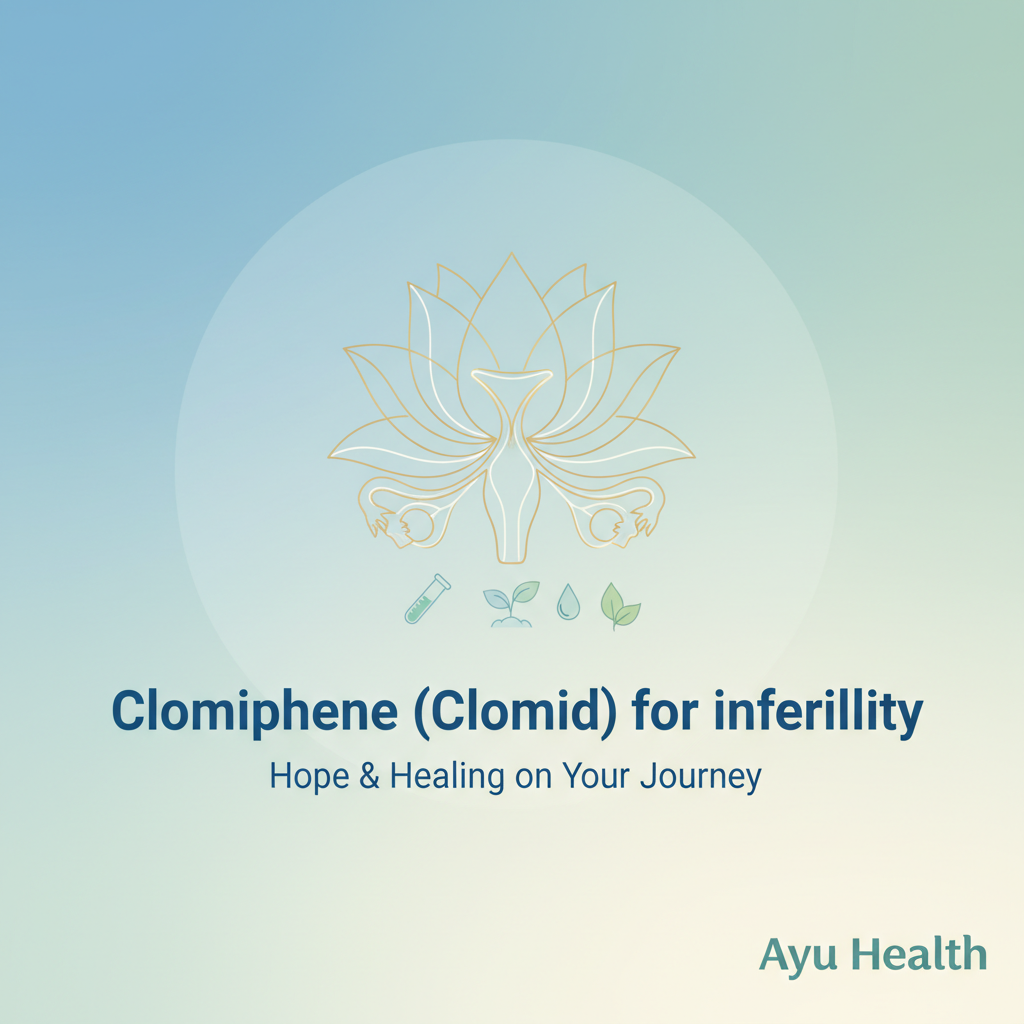What is Clomiphene (Clomid) for infertility?
Clomiphene citrate, commonly known as Clomid, is a medication primarily used to treat infertility in women. It's a non-steroidal anti-estrogen medication that works by stimulating ovulation, the release of an egg from the ovary. This makes it a common first-line treatment option for women who are struggling to conceive due to irregular or absent ovulation.
For many Indian women facing infertility challenges, Clomiphene offers a relatively affordable and accessible route to potentially achieving pregnancy. It is crucial to understand how it works, what to expect during treatment, and the associated risks and benefits before starting Clomiphene. This blog provides a comprehensive guide tailored to the needs and concerns of Indian patients considering Clomiphene for infertility.
Key Facts:
- Clomiphene is an oral medication.
- It stimulates the ovaries to release eggs.
- It is a common treatment for women with irregular periods or PCOS.
- Success rates vary depending on individual factors.
- It is relatively affordable compared to other fertility treatments.
Why is Clomiphene (Clomid) for infertility Performed?
Clomiphene is prescribed to address various infertility issues in women. It works best when the woman's ovaries are capable of producing eggs but are not doing so regularly.
Main conditions/indications:
- Irregular Menstrual Cycles: When a woman's menstrual cycle is inconsistent or unpredictable, it can indicate ovulation problems.
- Anovulation: This refers to the complete absence of ovulation.
- Polycystic Ovary Syndrome (PCOS): PCOS is a hormonal disorder that often causes irregular periods and ovulation difficulties. It's a common cause of infertility in Indian women.
- Unexplained Infertility: In some cases, the cause of infertility remains unclear after initial investigations. Clomiphene might be used to enhance ovulation in these situations.
- Enhancing Ovulation: Even if a woman ovulates regularly, Clomiphene can sometimes be used to increase the chances of pregnancy by stimulating the release of multiple eggs.
When doctors recommend it:
Doctors typically recommend Clomiphene as a first-line treatment when:
- A woman is diagnosed with ovulatory dysfunction.
- Other potential causes of infertility, such as blocked fallopian tubes, have been ruled out.
- The male partner's sperm count and quality are within acceptable limits.
- The woman is generally healthy and has no contraindications to Clomiphene use (see risks section below).
Preparation for Clomiphene (Clomid) for infertility
Proper preparation is essential for maximizing the chances of success with Clomiphene and minimizing potential risks.
Essential preparation steps:
- Consultation with a Gynecologist/Reproductive Specialist: This is the most crucial step. The doctor will assess your medical history, conduct a physical examination, and order relevant tests to determine if Clomiphene is right for you.
- Fertility Evaluation: This may include:
- Blood Tests: To check hormone levels (FSH, LH, estrogen, progesterone), thyroid function, and other relevant parameters.
- Pelvic Ultrasound: To assess the ovaries, uterus, and fallopian tubes. It can help rule out ovarian cysts or other abnormalities.
- Semen Analysis: To evaluate the male partner's sperm count, motility, and morphology.
- Hysterosalpingogram (HSG): An X-ray procedure to check if the fallopian tubes are open. This is crucial because Clomiphene is ineffective if the tubes are blocked.
- Lifestyle Modifications: Your doctor may recommend lifestyle changes such as:
- Maintaining a healthy weight.
- Quitting smoking.
- Reducing alcohol consumption.
- Managing stress.
- Discuss Potential Risks and Side Effects: Have an open discussion with your doctor about the potential risks and side effects of Clomiphene.
- Understand the Treatment Protocol: Clarify the dosage, timing, and duration of Clomiphene treatment.
India-specific tips:
- Choose a Reputable Clinic/Doctor: Select a gynecologist or reproductive specialist with experience in treating infertility using Clomiphene. Research online reviews and ask for recommendations from friends or family.
- Review Insurance Coverage: Check if your health insurance policy covers fertility treatments, including Clomiphene.
- Affordable Options: Discuss generic versions of Clomiphene with your doctor, as they are generally more affordable than brand-name drugs.
- PCPNDT Act Awareness: While not directly related to Clomiphene, be aware of India's Pre-Conception and Pre-Natal Diagnostic Techniques (PCPNDT) Act, which prohibits sex determination of the fetus. This is a general awareness point for all pregnant women in India.
- No specific fasting requirements before taking Clomiphene, but follow any instructions given by your doctor regarding blood tests.
- Documents needed: Bring all relevant medical records, including previous test results and medical history, to your consultation.
What to expect:
- A thorough medical evaluation.
- A detailed explanation of the Clomiphene treatment protocol.
- Potential lifestyle recommendations.
- A clear understanding of the risks and benefits of Clomiphene.
The Clomiphene (Clomid) for infertility Procedure
Clomiphene treatment involves a specific protocol that needs to be followed carefully under the guidance of your doctor.
Step-by-step (concise):
- Start of Menstrual Cycle: The first day of your period is considered day 1 of your menstrual cycle.
- Medication Timing: Clomiphene is typically taken orally for five days, usually starting on day 3, 5, or sometimes day 7 of your cycle, as instructed by your doctor. Days 3-7 or 5-9 are the most common timings.
- Dosage: The usual starting dose is 50 mg per day. Your doctor may adjust the dose in subsequent cycles based on your response to the medication. Doses can range from 25mg to 100mg.
- Taking the Medication: Take the Clomiphene tablet(s) at the same time each day with a glass of water.
- Monitoring (Optional): Your doctor may recommend monitoring your response to Clomiphene with blood tests (to check estrogen levels) and/or ultrasounds (to track follicle development).
- Ovulation: Ovulation typically occurs 5-10 days after the last Clomiphene pill.
- Timing Intercourse: Your doctor will advise you on the optimal timing for intercourse to maximize your chances of conception. This is usually around the time of ovulation.
- Pregnancy Test: If you do not get your period within two weeks of ovulation, take a pregnancy test.
- Follow-up: If you do not become pregnant after the first cycle, your doctor may repeat the treatment for several cycles, adjusting the dosage as needed.
Duration, comfort level:
- The Clomiphene treatment cycle lasts for about a month (from one period to the next).
- Taking the medication itself is simple and comfortable.
- Some women may experience side effects, such as hot flashes, mood swings, or abdominal discomfort. These are usually mild and temporary.
What happens during the test (monitoring):
- Blood Tests: A small sample of blood is drawn from a vein in your arm.
- Ultrasound: A transvaginal ultrasound may be performed to monitor the growth of follicles in your ovaries. This involves inserting a small probe into the vagina. It may cause mild discomfort.
Understanding Results
Understanding the results of Clomiphene treatment is crucial for making informed decisions about your fertility journey.
Ovulation Rate: Approximately 70-80% of women will ovulate when treated with Clomiphene. This means the medication successfully stimulated the release of an egg.
Pregnancy Rate: Around 40% of women who ovulate with Clomiphene will become pregnant. This is a cumulative pregnancy rate over several cycles of treatment.
Factors Affecting Success:
- Age: Women under 35 generally have higher success rates.
- Other Fertility Issues: Existing fertility problems, such as tubal blockage or male factor infertility, can reduce the chances of success.
- PCOS: Women with PCOS may require higher doses of Clomiphene and may benefit from combination therapy with Metformin.
- Lifestyle Factors: Healthy lifestyle habits can improve success rates.
What results mean:
- Ovulation Confirmed: If blood tests or ultrasounds confirm that you are ovulating, it means the Clomiphene is working as intended.
- No Ovulation: If you are not ovulating despite taking Clomiphene, your doctor may increase the dosage or consider alternative treatments.
- Pregnancy Achieved: A positive pregnancy test indicates that the Clomiphene treatment was successful.
Next steps:
- If Pregnant: Continue to follow your doctor's instructions for prenatal care.
- If Not Pregnant: Discuss with your doctor about repeating the Clomiphene treatment for another cycle or exploring other fertility options, such as IUI (intrauterine insemination) or IVF (in vitro fertilization).
- Combination Therapy: For Indian women with PCOS, your doctor may suggest combining Clomiphene with Metformin to improve ovulation and pregnancy rates.
Costs in India
Clomiphene is considered a relatively affordable fertility medication in India.
Price range in ₹ (tier-1, tier-2 cities):
- The cost of Clomiphene tablets can range from ₹73 to ₹328 for a strip, depending on the brand and dosage.
- Consultation fees with a gynecologist or reproductive specialist can range from ₹500 to ₹2000 per visit.
- Ultrasound monitoring can cost between ₹800 to ₹2500 per scan.
- Blood tests can cost between ₹500 to ₹3000 depending on the tests ordered.
Government vs private:
- Clomiphene is generally more affordable in government hospitals and clinics. However, waiting times may be longer.
- Private hospitals and clinics offer more personalized care but are typically more expensive.
Insurance tips:
- Check with your insurance provider to see if your policy covers fertility treatments, including Clomiphene.
- Some insurance companies may have specific requirements or limitations on coverage.
- If your insurance does not cover fertility treatments, explore options for financing or payment plans.
How Ayu Helps
Ayu helps you manage your fertility journey by securely storing your Clomiphene treatment records digitally. Easily track your progress, share your reports with your doctor via a simple QR code, and monitor your hormone levels and ultrasound results over time.
FAQ
Q1: How long should I take Clomiphene?
The typical course of Clomiphene treatment is 3-6 cycles. If you don't conceive after 6 cycles, your doctor may recommend alternative treatments.
Q2: What if I miss a dose of Clomiphene?
Consult your doctor immediately for instructions. Do not double the dose to catch up.
Q3: Can Clomiphene cause multiple pregnancies?
Yes, Clomiphene increases the risk of having twins (around 5-10%) or higher-order multiples.
Q4: What are the signs of ovulation while on Clomiphene?
Signs of ovulation may include:
- Change in cervical mucus (becoming clear and slippery).
- Increased basal body temperature.
- Ovulation pain (mittelschmerz).
- Positive ovulation predictor kit (OPK) result.
Q5: Can Clomiphene affect my mood?
Yes, Clomiphene can cause mood swings, irritability, and anxiety in some women.
Q6: When should I call my doctor during Clomiphene treatment?
Call your doctor immediately if you experience any of the following:
- Severe abdominal pain or bloating.
- Visual disturbances (blurred vision, double vision).
- Heavy vaginal bleeding.
- Shortness of breath or chest pain.
Q7: Is Clomiphene safe for long-term use?
Prolonged use of Clomiphene may be associated with an increased risk of ovarian cancer. It is important to discuss the risks and benefits with your doctor.
Q8: Can Clomiphene be used for male infertility?
Clomiphene can sometimes be used to treat male infertility by increasing testosterone levels and sperm production, but this is less common than its use in women. A urologist or andrologist should be consulted for male infertility issues.
Disclaimer: This information is intended for general knowledge and informational purposes only, and does not constitute medical advice. It is essential to consult with a qualified healthcare professional for any health concerns or before making any decisions related to your health or treatment.



